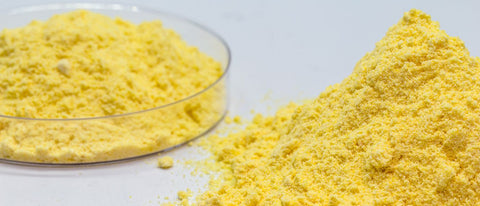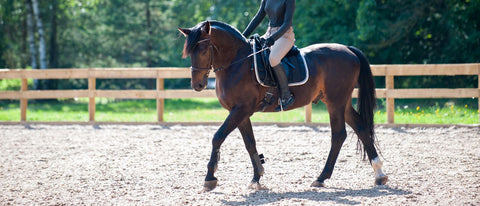
Florian ist aufgewachsen auf einem Bauernhof. Umgeben von Pferden, entdeckte er früh seine Faszination für diese majestätischen Tiere. Inspiriert von seiner reitbegeisterten Mutter, entwickelte er das Nahrungsergänzungmittel - Pferdegold. Seine tiefe Verbundenheit zur Natur und die leidenschaftliche Hingabe zu Pferden trieben ihn an, sein Unternehmen zu gründen.
Your horse's well-being is especially important to us at Pferdegold. Therefore, today we're devoting ourselves to an essential topic: deworming horses.
Regular deworming is important to ensure your horse receives proper care.
In this guide, you'll learn how to properly deworm your horse, from choosing the right horse worming treatment to considering specific deworming needs. Learn how often a horse needs to be dewormed and which products are particularly recommended.
We'll give you valuable tips and show you how you can optimally support your four-legged friend with the right worming treatment for horses.

Worm infestation in horses: How often is deworming necessary?
The frequency of deworming your horse depends on various factors.
In general, the younger the horse, the more often the worming treatment should be done.
-
Foals and young horses require more frequent deworming than adult animals.
- For adult horses, experts recommend deworming about once or twice a year.
This frequency may vary depending on how often your horse is exposed to worms.
Regular stool examinations are essential to accurately determine worm infestation and adjust deworming accordingly.
The correct determination of the timing and the selection of the appropriate worming treatment for horses are crucial for successful deworming.
Symptoms and warning signs of worm infestation
When it comes to your horse's health, you should pay particular attention to signs of worm infestation.
Typical symptoms may include weight loss, dull coat, or digestive problems such as diarrhea .
Signs of discomfort or reduced performance can also indicate a worm infestation.
It is important to take these warning signs seriously and to carry out a deworming treatment if you suspect something is wrong.
Regular monitoring and, if necessary, early deworming can help prevent more serious health problems.

Perfect for your horse: Pferdegold® supplementary feed!
These specially developed supplements support your horse's diet and provide it with natural nutrients. Made in Germany, grain-free and drug-free, with a 30-day money-back guarantee.
Try it now!What should be considered when deworming a horse?
There are a few things to consider when deworming your horse. First, it's important to choose the right product, as not all deworming treatments are designed to treat all parasites .
Your veterinarian can advise you on this, as the medication must be changed each time you use it to avoid developing resistance .
Choosing the right dosage is also crucial to minimize the side effects of a horse deworming treatment .
By carefully selecting and dosing the worming medication, you have the chance to reduce the burden on your horse after deworming from the outset.
After deworming, it is advisable to exercise the horse carefully.
A gentle exercise program can help your horse recover from treatment.
Riding horses after deworming should only be done when they feel completely well.
Observe your horse closely and always adapt the activities to its condition .

What should you feed your horse after deworming?
After a deworming treatment, it's important to support the development of your horse's intestinal flora . A healthy intestinal flora is crucial for digestion and the horse's overall well-being.
A balanced diet rich in fiber and essential nutrients supports the regeneration of the intestinal flora.
Deworming young horses correctly
Deworming young horses, especially foals, requires special attention and care .
Because their immune systems are still developing, they are often particularly susceptible to parasitic infestation .
Regular and appropriate deworming is therefore crucial to ensure the health and well-being of young horses.
Here is an overview of the most important aspects of deworming young horses:
When should foals be dewormed?
Start the first deworming treatment for foals at about two months of age.
This early start is important because foals are particularly susceptible to roundworms, which can affect their health and development.
Deworming for foals, how often?
The frequency of deworming should be higher in the first months of life .
Monthly deworming is recommended until the age of six months to prevent severe parasite infestation.
Thereafter, the frequency can be gradually reduced .
Adaptation of the deworming strategy
Observe the young horse carefully and adapt the deworming strategy to its individual needs and environment.
This includes regular assessment of worm infestation through stool examinations and adjusting the deworming plan based on these results.

Checklist: Effective hygiene measures for parasite control
Effective parasite control in horses involves more than just regular deworming.
Hygiene measures are a crucial component in the prevention and control of parasite infestation.
Here is a checklist of measures that every horse owner should consider:
✔ Regular stable cleaning:
A clean environment is essential for your horse's health . Ensure the stable is cleaned and disinfected regularly.
This reduces the number of parasite eggs and larvae that can survive in the stable.
Remove manure from the stable daily and change the bedding regularly to prevent the accumulation of parasites.
✔ Manure management on pastures:
Regular removal of manure from pastures is essential to prevent the spread of parasites.
Ideally, this should be done daily or at least several times a week .
Removing the feces prevents horses from repeatedly coming into contact with the same parasites, resulting in a lower infection rate.
✔ Quarantine for new horses:
Any new horse should initially be quarantined and dewormed before being introduced to other horses. This helps prevent the introduction of new parasite species.
A stool sample taken five days after deworming can confirm whether the deworming treatment was successful and the horse is free of parasites.
✔ Regular pasture care:
Pastures should be maintained regularly to minimize parasite infestation.
This includes measures such as mowing and removing pasture waste and mulching pastures to eliminate soil-borne larvae .
Rotational grazing can also help reduce parasite burdens by providing horses with fresh, uncontaminated pastures.
Which worms should horse owners be aware of?
It is important for horse owners to know different types of worms that can affect the health of their horses.
Here is an overview of the most important worm species:
-
Small strongyles (Cyathostominae): These common intestinal parasites can cause inflammation and damage in the digestive tract, which can lead to weight loss and colic.
-
Large strongyles (Strongylus spp.): They are known for their dangerous migrations through the horse's body, which in the worst case can cause severe organ damage.
-
Roundworms (Parascaris equorum): Especially common in young horses, they can cause growth disorders and respiratory diseases .
-
Tapeworms (Anoplocephala spp.): Their presence can lead to digestive disorders and colic . Regular deworming of horses, especially against tapeworms, is therefore important.
-
Pinworms (Oxyuris equi): They cause intense itching and noticeable discomfort in the horse's anal area, which can lead to skin irritation and restlessness .
- Gastric bots (Gasterophilus spp.): These parasites nest in the stomach and can cause serious ulcers and digestive disorders , which impairs food intake and general well-being.
Differences and advantages: strategic vs. selective deworming
Deworming in horses can be done in two ways: strategic or selective.
Both approaches have their specific advantages and areas of application, depending on the needs and circumstances of the individual horse.
Strategic horse deworming
Strategic deworming is based on a fixed schedule , regardless of the horse's individual infection status.
This method is widely used to provide broad protection against most worm species .
It is particularly suitable for herds in regions with a high risk of infection or for horses that are regularly exposed to stress and high levels of strain .
However, this method carries the risk of parasites developing resistance to the anthelmintics used. Therefore, it is all the more crucial to change the anthelmintic to minimize the risk of parasites developing resistance to the anthelmintics.

Pferdegold® supplementary feed!
Pferdegold is a small family business from Bavaria with a big dream: to produce the best horse feed. We see ourselves as a family of equestrians who want to provide your horse with the ideal nutrition. 100% natural and perfectly tailored to your horse's needs.
Try it now!Selective horse deworming
Selective deworming of horses depends on the actual infestation of the horse.
This approach requires regular fecal examinations to determine which horses need treatment.
Selective deworming reduces the risk of resistance and is often more cost-effective .
It is particularly suitable for well-managed stables where horses can be individually monitored.
This method supports the long-term effectiveness of deworming medications and is an important component of a comprehensive parasite control program.

Why does deworming vary depending on the season?
The need for deworming horses varies by season, as the risk of worm infestation and the types of prevalent parasites change.
➽ Deworming for horses in spring:
In spring, when horses return to pastures in greater numbers, the risk of worm infestation increases.
At this time it is especially important to carry out a deworming treatment, especially against small strongyles , since these worms are most active in spring.
Treatment against tapeworms is also advisable in spring, as the risk of infection may be higher after winter.
➽ Deworming for horses in summer:
During the warmer months, certain parasites, such as stomach worms and fly larvae, can become more active and thus pose an increased risk of infection .
It is advisable to administer a deworming treatment specifically targeting these parasites during this time of year. Regular monitoring of worm infestation through fecal examinations remains important to assess the need for further treatment.
➽ Deworming for horses in autumn:
In autumn, horse owners should consider deworming for tapeworms and roundworms , as these parasites can become more active in the cooler season.
Tapeworm treatment in the fall helps reduce the risk of infection during the winter.
➽ Deworming for horses in winter:
During winter, the risk of infection from pasture parasites is lower, but horse owners should still remain vigilant.
At this time of year, it may be useful to check for worm infestation by means of a stool examination to determine whether deworming is necessary.
Our tip:
Overall, it is important that horse owners regularly check their animals' worm infestation and adapt the deworming plan to the seasons and the individual needs of their horse.Conclusion
We hope this guide has helped you understand the importance of proper deworming for horses.
By considering the different needs of each season and choosing the right deworming strategy, you can promote your horse's well-being.
Don't forget that the frequency of deworming should always be adjusted to your horse's age.
If you have any questions or concerns, please do not hesitate to consult a specialist.
FAQ
Can horses also be dewormed in a “natural” way?
Natural deworming of horses is possible, but its effectiveness can vary.
Natural methods such as the use of certain herbs or dietary measures can support intestinal health and contribute to a less hospitable environment for worms.
However, these methods do not always completely replace the need for medicinal deworming, especially in cases of severe infestation.
It is important to discuss natural approaches with a veterinarian to find the best strategy for your horse.
How long are horses not allowed to go out to pasture after deworming?
After a deworming treatment, horses can usually return to the pasture without a long wait.
There is no standard recommendation to keep horses out of the pasture after deworming.
However, it's advisable to monitor your horse's stool for a few days after deworming and keep the pasture as clean as possible to avoid recontamination. If you have specific concerns or receive other instructions from your veterinarian, you should follow these recommendations.
How long does a horse shed worms after a deworming treatment?
After a deworming treatment, the horse usually begins to excrete dead worms within a few days.
The exact time it takes for worms to be excreted after a deworming treatment can vary, depending on the type of deworming treatment, the parasite, and the extent of the infestation.
Typically, most worms are eliminated within one to two days of treatment. How quickly a deworming treatment works and how long it takes to eliminate them should be discussed with your veterinarian to ensure the deworming is effective.
IMPORTANT:
Pferdegold is not a substitute for veterinary diagnosis or treatment . The information contained in this article is for general informational purposes only and is intended to help improve your horse's well-being.
Pferdegold products do not treat or cure diseases , but rather support your horse in correcting nutritional deficiencies through targeted nutrient intake. However, they are not a substitute for professional advice from a veterinarian or specialist.
If your horse has any health problems , we strongly recommend consulting a veterinarian . Pferdegold assumes no liability for decisions made based on the information provided here.
Learn more about the world of horses in our guides!

















